Hype to haul- Booktok is fueling a fiction frenzy and an aesthetic desire to be a reader
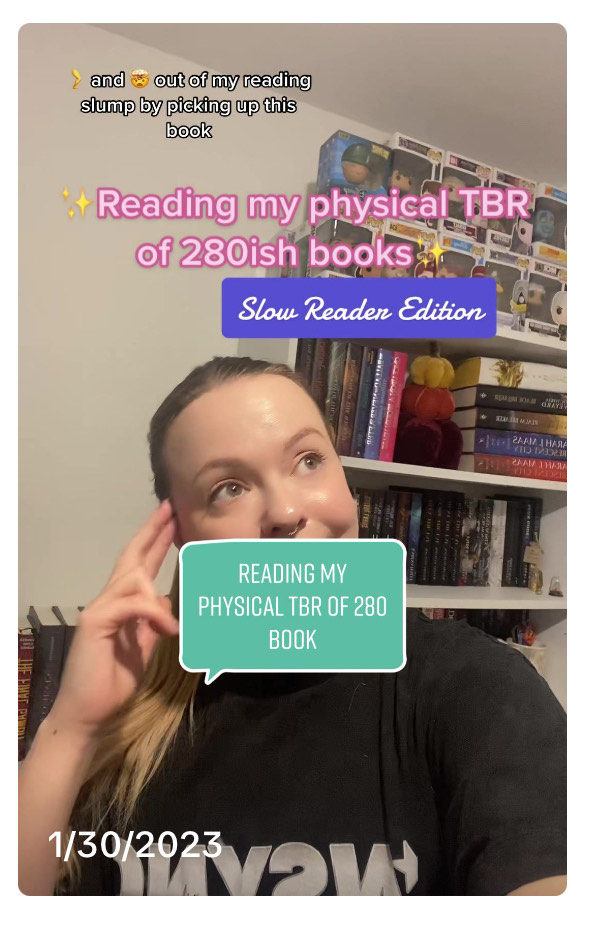
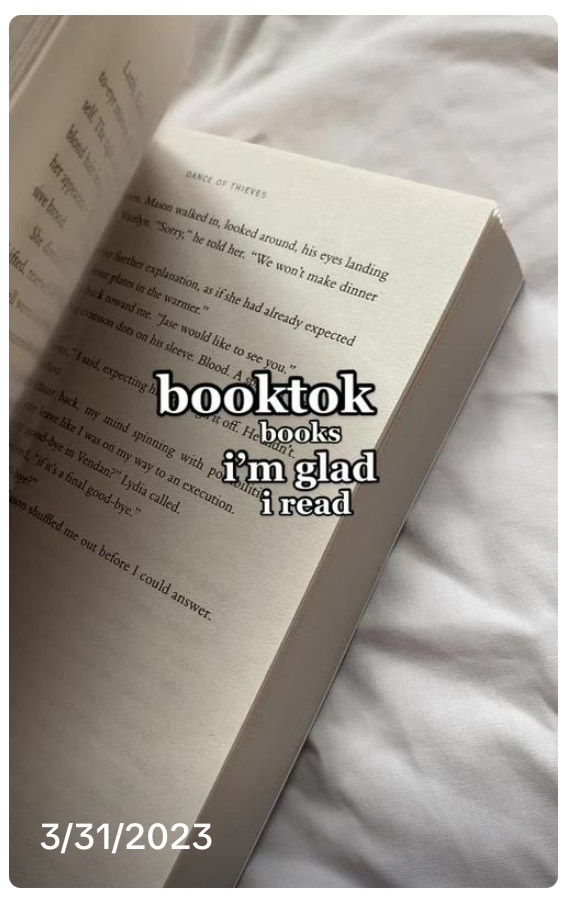
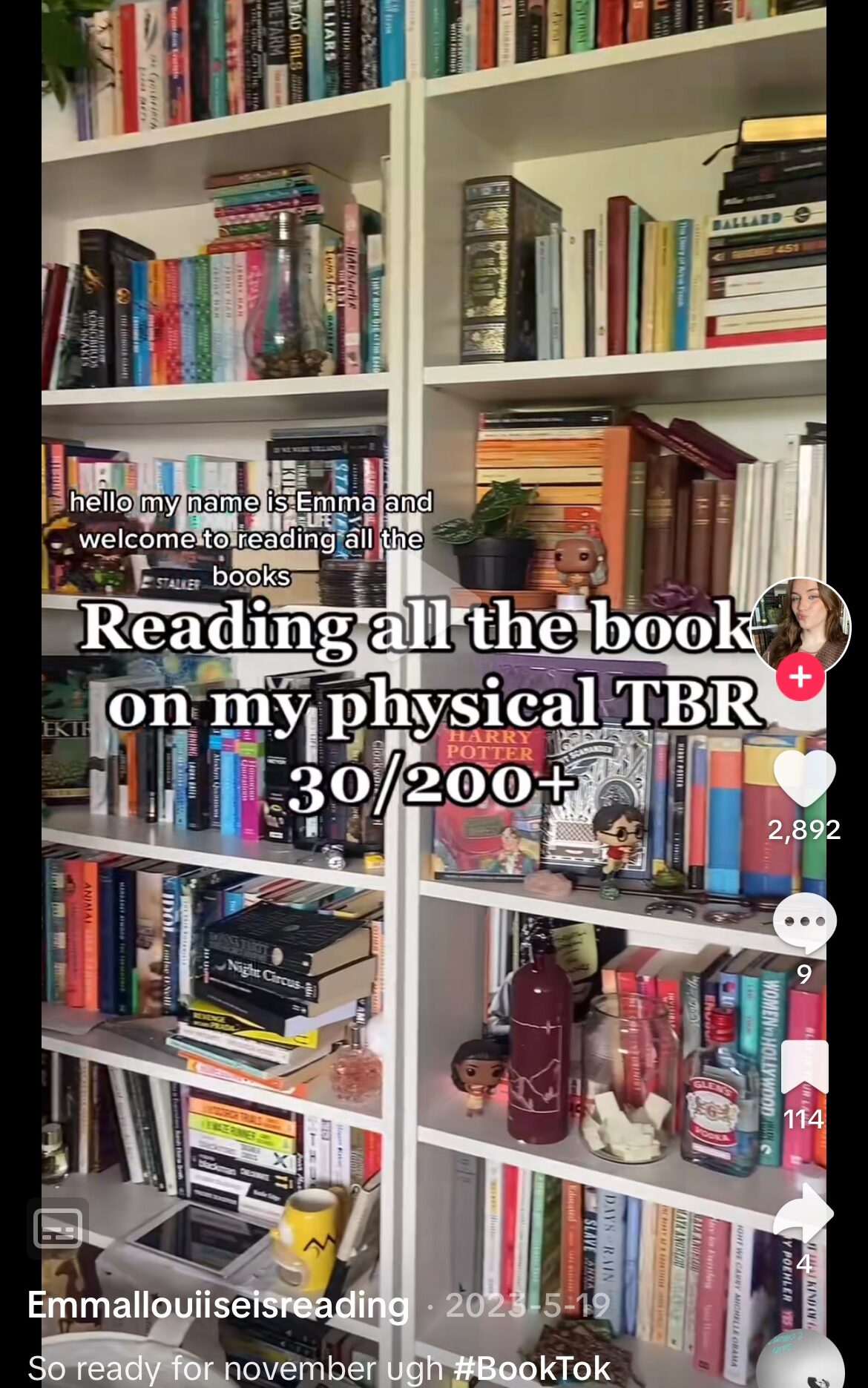
‘It was like entering a parallel universe where reading wasn’t just something that someone did for fun, it was a lifestyle, an aesthetic, people were “readers”’- Barry Pierce
This article is in response to Bloomberg and GQ’s articles on this topic. Find the links below:
- GQ- In the shallow world of BookTok, being a ‘reader’ is more important than actually reading.
- Bloomberg- Tiktok is turning the publishing world into fast-fashion
I have always been a fan of reading, a ‘book lover’, you would say. But over the last three years, my interest and enjoyment of the hobby has taken a turn, with my bookshelves filling with more fantasy fiction and my ‘for you’ page becoming a never-ending library.
The world of Book-Tok has ushered in a new vibrant community of creativity and commerce online, where books are not just read but aestheticised and hyped over. Over the last year, however, there has been a growth of discourse amongst publishing critics and journalists who have noted this rapid growth and its influence on physical book spaces. Some argue that Book-Tok, dominated by young women, is turning fiction into bland, repetitive trends, ultimately harming the quality of literature.
Fast fashion in Literature
Fast fashion comes into mind here with the quickness and hyper-consumerism of it all. It is a business model taking on the replication and mass-production of trends with heavy marketing and promotion online. Book-Tok promotes specific tropes, aesthetic covers and viral authors, leading to a homogenous landscape where “everyone” seems to be reading the same thing. The urge to own and display collected untouched books is much like owning oversized scarves and ballet pumps, that won’t be fashionable in a matter of months.
The speed characteristic through social media has extended from fashionwear to books and is a thought on readers’ minds, with the over-consumption and need to buy what everyone has.
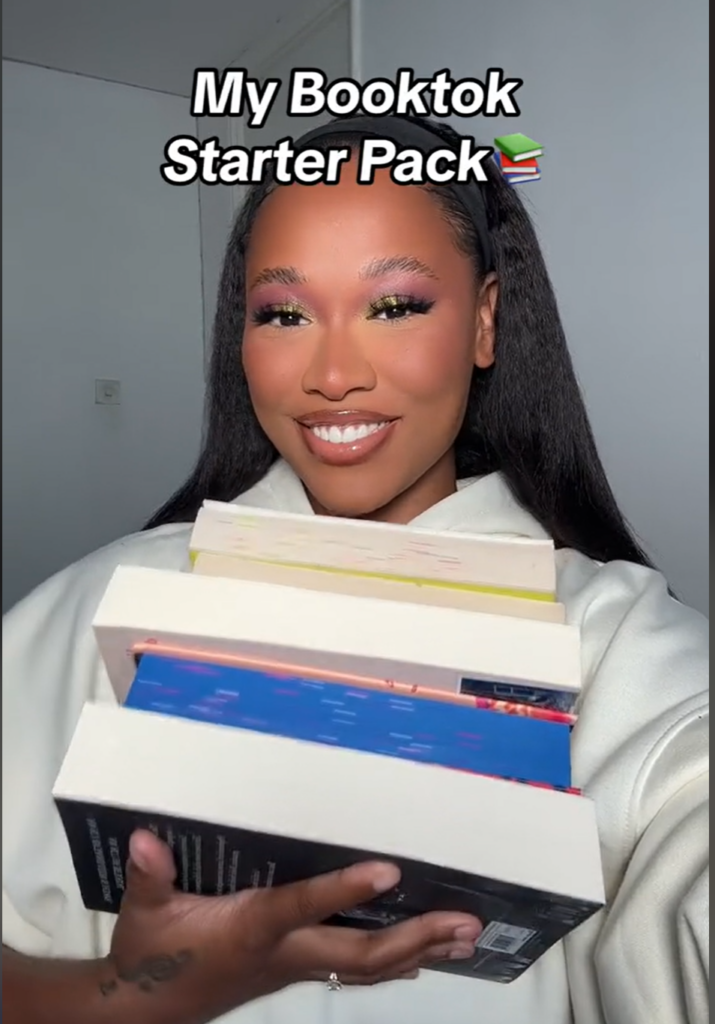
The algorithm’s game
A widespread criticism of the platform is that Book-Tok recommends the same twenty books, with the familiar white female authors only being recognised on the site. To some extent I agree you see the same authors repeatedly, but is it Tiktok’s fault?
Critics only spend a certain amount of time scrolling to see a very small collection of recommendations. Blaming Book-Tok entirely for the perceived homogenisation of literature is overly simplistic. If you are new to the platform you will only be introduced to the same authors, as those videos have statistically kept the most people engaged. Showing the same content to everyone who finds their way onto the outskirts of the community is the baseline before offering niches of interest beyond the mainstream.
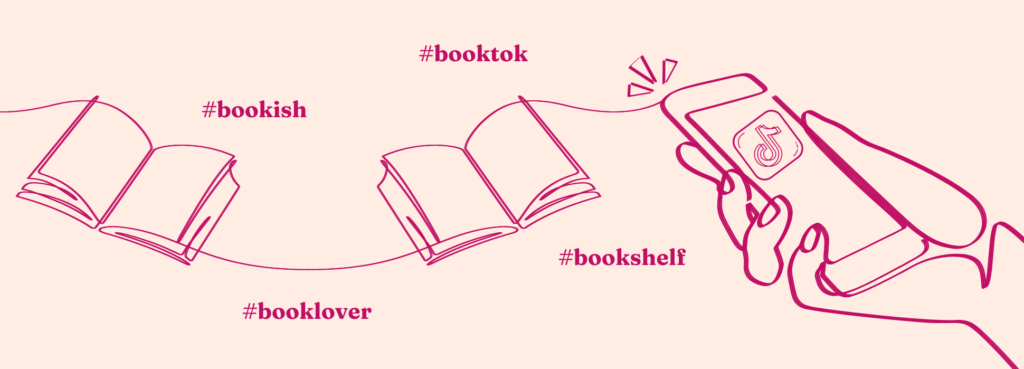
The algorithm’s purpose isn’t to offer you a diverse range of intellectual and classic novels, but to prioritise keeping you on the app and scrolling. Offering more engagement to the content you like, interacting, and watching videos for longer is what it needs to learn about your preferences. In other words, collect data on you to keep you on the platform. It will show you similar things you have already seen. Therefore you will see videos that have similar keywords and captions, including books.
A catalyst for change

So with this, the audience hovering on the same videos, seeing the same books recommended to them more and more is what gets the viral hit, which then reflects on that novel’s sales. Dismissing the site and diminishing it to just a literary wasteland seems narrow-minded.
The audience has more control over the success of a book, which is more evident in this digital space, democratising access for young and emerging authors. Traditionally, many writers don’t get the instant gratification of becoming a best-seller, as it is a slow process making their way on shop shelves and over years, gain popularity from recommendations.
Today, the shareability of a video and digital word-of-mouth advertising has meant authors are seeing results in a matter of months. This is only overtly positive! I would argue this is because of more accessible novels hitting the mass market. The idea that you only have to read intellectual books to broaden and educate one’s horizon isn’t a priority, rather than enjoyment and escapism from reality.
More undiscovered voices are being heard and rewarded, getting recognition for their work which they deserve. Why undermine that?
The double-edged sword of popularity
It can be argued only certain genres are getting the Book-Tok fame with romance, fantasy, and contemporary literature being spotlighted. Popcorn-lit kind of books and fast-paced reads are suiting a generation with shorter attention spans.
For example Lauren Roberts and her debut novel ‘Powerless’ exemplifies this. Nominated for Best YA fantasy & science fiction (Goodreads Choice Awards 2023), the excitement from fans surrounding a Hunger Games reinvention, has a strong plot and keeps readers on their toes.
This may only concern certain tropes for the demand of ‘enemies-to-lovers- and ‘who did this to you’ repetition in the most hyped books, removing the unexpected. While familiar narratives offer comfort and nostalgia, it also feels like an endless loop of the same book in different guises. The predictability can be suffocating and stifle diversity amongst more daring and unique narratives beyond the hashtags.
There is this idea of otter writers and dolphin writers. Dolphins will put on a show and do a trick (write a book) and get rewarded with a fish (sales and engagement) and in their mind if they perform again they will be rewarded, so they do it again and again the same. Otters will do a trick and recieve a fish but goes ‘Okay, that was fun, but I’m doing something completely different next time’.
Listen to this podcast episode that expands on this idea:
Magic Lessons Ep. 207: “Living the Dream and Facing the Nightmare” featuring Neil Gaiman.
Writers have different aims whether to perform for the market so they will get that success because of a trend, or they write a genuine story and it will be up to their creative vision and authenticity to attract readers.
From pages to platforms
Book worms have always devoured stories and in this digital age have found a vibrant forum to share their interests and talk about their passions. However, the criticism that ‘the TikTok books community is more about a lifestyle aesthetic than actual reading’, curating a lifestyle brand isn’t a fair assessment.
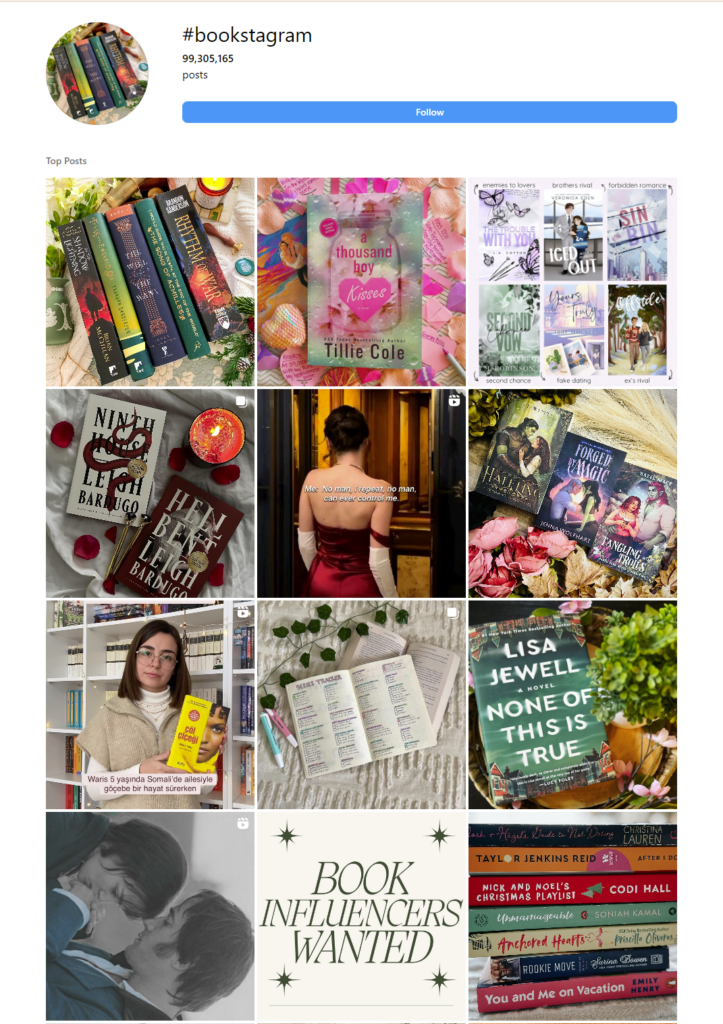
The desire to connect over shared interests isn’t a new phenomenon. Platforms like Instagram are portfolios of our curated selves, romanticising the picturesque part of our lives we want the world to see. We care about how we present ourselves to people who view our platforms so they get an idea of who we are.
Tiktok is full of young people navigating their identity as they grow up and try to seek belonging. Reading is still a niche hobby and most people don’t have community in person, so turn online where they wear the hobby on their sleeves to find people alike. The aesthetics is just a visual language to signal people and encourage them to engage and I believe it shouldn’t be be critiqued.
The bookish identity
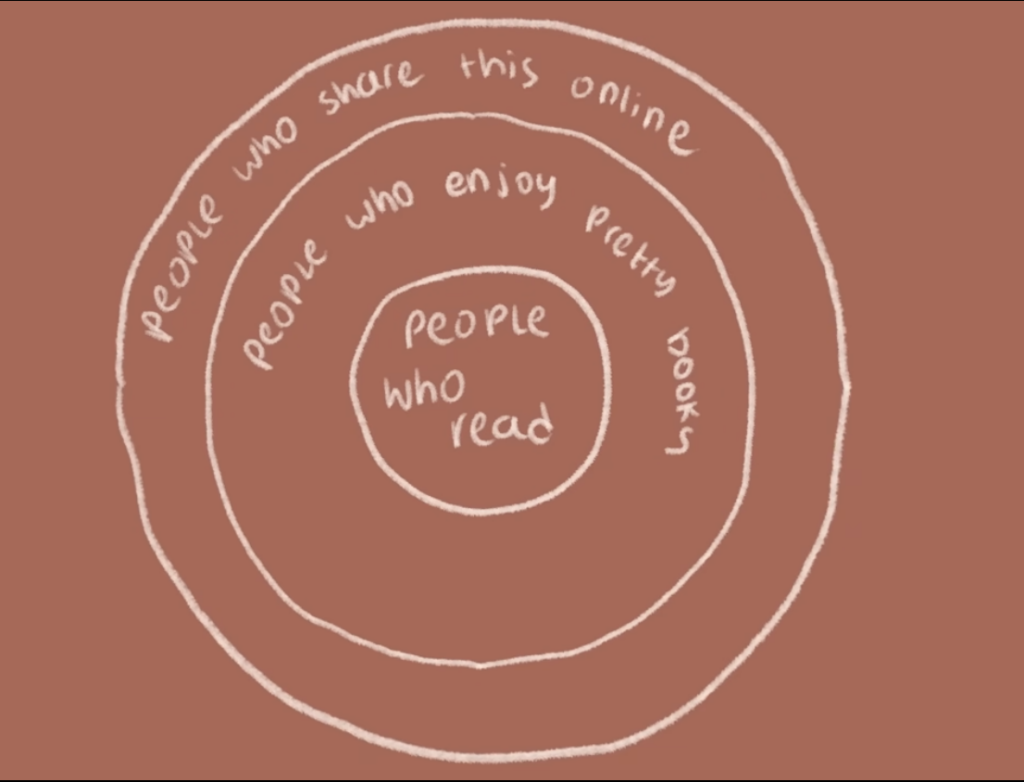
Young people who have a niche online with large audiences are going to influence that part of the internet. Assuming a ‘reader’ identity shouldn’t be limited to just how many books someone buys and doesn’t read or likes to spend more time on bookish social media than reading. Dismissing their ‘reader’ identity as mere shelf curation and enjoying other aspects of reading than just having a nose in a book proves, that its not an isolating interest to have.
Most hobbies become a part of an individuals daily life, so labelling it as a ‘parallel universe’ doesn’t seem accurate. We live in an individualistic society where we spend a lot of time online whether for work or leisure and a person’s single hobby doesn’t make a sole identity, it intersects many interests.
While bookcases may overflow and “to-read” piles may tower, judging a reader’s authenticity by their Goodreads 2024 reading challenge, the matter is that it is fueling imaginations, creativity, curiosity and enjoyment of the peacefulness reading can be, when everything is so busy elsewhere in our lives.

Publishers
Having this identity and deep-rooted passion however, can make you vulnerable to the glittery marketing of publishers that lure readers into over-consumption. Publishing houses’ advertisements and commissions have pioneered the platform for commercialisation, the perfect environment to promote releases with a readily available audience.
Editors, keen on riding the hype wave, see what is trending and what is most likely to sell prioritising quick releases and commercially viable projects, to get it into the hands of readers whilst there is still attention on plot lines.
This curated selection, while a boon for the industry and a gateway for new readers, can also create a high-pressure environment. The need to be up-to-date and on the same trend wave as everyone else, with the fear of missing out isn’t the mindset to have.
The popularity of these books has been a huge boost for the industry and its amazing that so many people are picking up the hobby and getting invested in the stories. However, the amount of books being churned out is overwhelming.
The platform itself act as a filter to drown out the noise from the industry and helps people find books that are worth their time reading. At the end of the day the books speak for themselves and I personally find the community helpful with finding me a book I will genuinely enjoy.
Happily ever after
The idea that buying books and reading books are two separate things is true, it is a bibliophiles secret shame. As a reader I have seen myself fall into the hole that is often difficult to get out of, but is there any harm? Just a nuance of any obsession, its an escape from reality and something I find enjoyable to do for relaxation.
Reading is different today- more colourful, contemporary, and visual, offering an alternative to reading intellectual and hard-hitting novels with many words we don’t understand. Its more accessible and is finding its place in the heavy digital world we live in. Celebrating diversity and ending the shame that has tabbed the corners of reading fantasy and romance books is a positive change that hopefully will continue.
Booktok only showcases a small corner of the literary world definitely amongst the young adults, but if its not an interest for you, you can explore recommendations beyond the hashtag and not limit yourself on all the amazing stories and adventures you can go on out there.
We should break free of the homogenisation and algorithm spell and use Book-Tok as a tool for discovery not dictation. Let’s embrace its potential, navigate its complexities and ensure that the future of reading remains diverse, inclusive and forever enchanting.